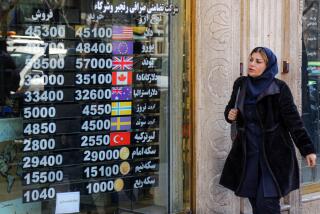Two newlywed Iranian Canadian couples among those killed in crash
- Share via
They met as graduate students in Montreal, drawn there by Concordia University’s well-regarded engineering program. They had both landed good jobs in the industry. They recently bought a house in Montreal. They had flown home to Iran for their wedding, attended by family.
“They were going to invite us for a housewarming party this new year,” said their friend, Ali Dolatabadi. “He was very excited.”
The couple, Siavash Ghafouri-Azar and Sara Mamani, was one of at least two pairs of newlyweds on board a Ukraine International Airlines jetliner when it went down shortly after takeoff from Tehran’s international airport early Wednesday, killing all 167 passengers and nine crew members.
Canadian Prime Minister Justin Trudeau said Thursday that intelligence indicated Iran had shot down the plane — possibly by mistake. The Iranian government has denied bringing down the jetliner.
The flight was en route to Kyiv, Ukraine, and 63 Canadians were on board. Many were of Iranian descent.
Dolatabadi, a professor at Concordia University, was one of Ghafouri-Azar’s thesis supervisors while he was a student there.
Dolatabadi recalled his former student as a “very intelligent” and “very kind person” who always worked hard. He was humble, Dolatabadi added, and always polite.
“It was one of the main features of his character — extremely hardworking and very much liked by everyone,” he said. “Yesterday, I closed my eyes and I remembered his smile.”
Dolatabadi met Ghafouri-Azar through the younger man’s uncle, who is one of the professor’s closest friends.
The last time he saw Ghafouri-Azar was just before Christmas break. Dolatabadi usually offers chocolate to office visitors during the holidays, he said. Ghafouri-Azar told his former professor that he had missed that holiday treat from his student days and hoped to stop by and catch up.
Dolatabadi and others in his department at Concordia have organized a memorial for Ghafouri-Azar and Mamani, scheduled for Friday.
“We wanted to be together and share memories and share grief,” he said. “We wanted to have room to sit down together so people feel they are not alone grieving.”
Dolatabadi said about half of the graduate students were Iranian. “An extremely high number,” he said.
Students and researchers such as Ghafouri-Azar and Mamani have increasingly chosen to study in Canada because getting into the United States on a student visa has grown more difficult as the United States has tightened its restrictions on immigration, he added.
“Canada is more attractive to Iranians because they can stay there and become citizens,” he said. “If they go to the States, they have to leave or stay until they get a green card and can’t go back home.”
Ghafouri-Azar worked as a performance specialist at Pratt & Whitney, an American aerospace manufacturer. His wife worked at the Canadian transportation company Bombardier.
Dolatabadi said that he spoke Thursday with Ghafouri-Azar’s uncle, who said he was thinking of going to Iran.
“They’re looking for the remains, but they can’t find anything. That’s the sad part of it for the family,” Dolatabadi said. “It’s very tough.”
If an Iranian surface-to-air missile did take down the plane, he added, the crash would be even harder for the family to process.
“It’s very heartbreaking. I still can’t believe it,” he said. “I go back to look at his pictures; it’s very difficult.”
He added: “It’s hard to imagine losing someone like him. I really miss him, that’s all I can say. It feels good when I talk about him.”
Another pair of newlyweds, Arash Pourzarabi and Pouneh Gorji, were on their way back to Canada after getting married in Iran on New Year’s Day.
“They were super peaceful together,” said Borna Ghotbi, their close friend and former classmate. “A really beautiful couple.”
As undergraduates at Tehran’s Sharif University of Technology, the couple studied computer engineering. They moved to Canada in 2017 as graduate students at the University of Alberta.
“We came to Canada on the same plane,” Ghotbi said.
One of his fondest memories with the pair was of leaving Tehran’s Imam Khomeini International Airport.
“We immigrated, all three of us together, that was a special moment,”said Ghotbi, a researcher at Vector Institute for Artificial Intelligence in Toronto. “When you stamp your passport and you’re officially out of the country, that was a really sensitive moment for all of us.”
Pourzarabi and Gorji made sure he didn’t feel alone. The trio laughed together as the plane headed for their new home, he recalled.
“I never felt homesick because of that,” he said. “I never felt like I was leaving home.”
He described Gorji, 25, as “light and cheerful and also sensitive to everyone and everything around her.”
Pourzarabi, 26, was protective, he added — not just of Gorji, but of everyone he loved.
“He had a pure heart,” Ghotbi said. “You could see strong determination in his eyes, always.”
He last saw Gorji about month ago, when she briefly came to Toronto for a conference for women in computer science. She was only there for a day, he said, but he wanted to make sure he saw his old friend.
He met her at the bus terminal as she headed back to the airport. The five minutes they’d shared made the trip worth it, he said, even if it wasn’t much time.
Not long after, a message from Gorji popped up on his phone. Seeing him made her feel at home, she wrote.
More to Read
Sign up for Essential California
The most important California stories and recommendations in your inbox every morning.
You may occasionally receive promotional content from the Los Angeles Times.











